10 Best Electrolyte Drinks, According to a Dietitian
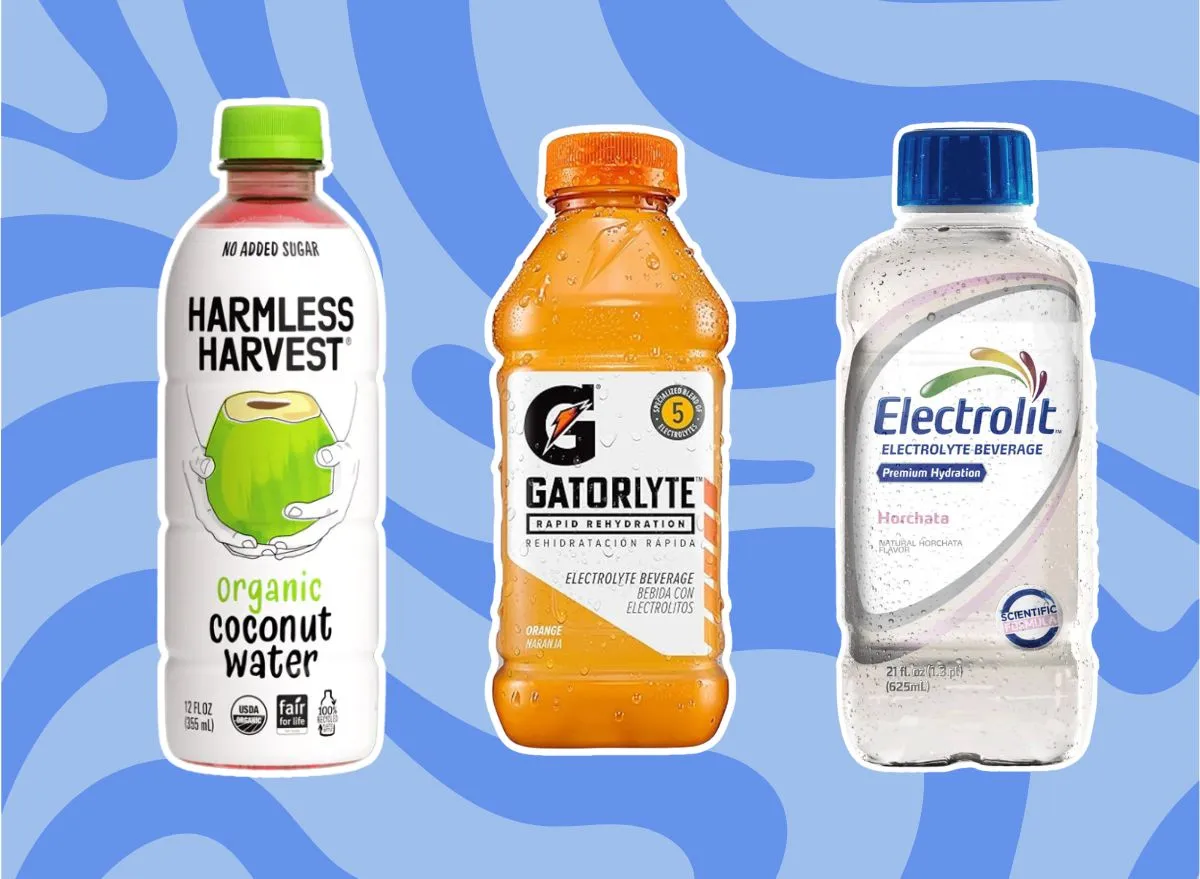
Whether you're pushing through a tough workout or are looking for general hydration, the right electrolyte drink can make all the difference. Electrolyte beverages contain essential electrolytes and other ingredients for proper hydration. While electrolytes can come in various forms, such as tablets and powders, you may prefer the portability of ready-to-drink electrolyte beverages in bottles or cans you take on the go.
Electrolytes are essential minerals that help maintain fluid balance, regulate nerve and muscle signals, and manage your body's pH levels to help it function at its best. The most common electrolytes are sodium, potassium, magnesium, chloride, and calcium. They are found in various quantities in fruits, vegetables, and dairy products. Still, electrolyte drinks appeal to many people as they provide a concentrated, convenient source of these minerals.
Most people can get enough electrolytes through a balanced diet, but athletes, anyone who exercises in warm weather, or those who lose electrolytes through vomiting or diarrhea may want to consider an electrolyte drink that can replenish and rehydrate.
Not all electrolyte drinks are created equal—some are loaded with sugar or do not provide adequate amounts of electrolytes for replenishment. In this article, we'll dive into the best ready-to-drink electrolyte beverages on the market, helping you find the perfect one to keep you hydrated, energized, and ready to crush your health and fitness goals.
How We Chose the Healthiest Electrolyte Drinks
We chose our list of the healthiest electrolyte drinks based on three core characteristics:
- Low in added sugar: While a bit of sugar can provide an energy boost, too much added sugar can lead to blood sugar spikes and inflammation. This may be especially relevant in those who have diabetes or insulin resistance. By choosing options containing natural sugar, such as sugar in coconut water, you can replenish your body without excessive calories and unnecessary sugar sources.
- Balance of electrolytes: A healthy electrolyte drink should have a balanced mix of the most common electrolytes lost through sweat. These include sodium, potassium, magnesium, calcium, and chloride. Because of their various functions, an improper balance between two electrolytes, such as sodium and potassium, can lead to issues like cramping or dehydration. Drinks with a balanced electrolyte profile ensure that your body stays in optimal working order, especially during and after intense exercise.
- Clean ingredients: A clean ingredient list typically means fewer artificial additives, preservatives, and chemicals, which can be harsh on the digestive system and potentially harmful over time. Opt for electrolyte drinks made with natural, easily recognizable ingredients such as monk fruit or coconut water. By doing this, you're giving your body what it needs without the extras it doesn't. Clean labels typically signal a product closer to nature, meaning better nutrient absorption and a healthier, more sustainable choice.
Together, these three characteristics ensure that you stay hydrated and do so in a way that supports optimal performance and long-term health. Read on, then check out the 10 Healthiest Drinks to Sip.
Gatorlyte Rapid Rehydration Electrolyte Beverage
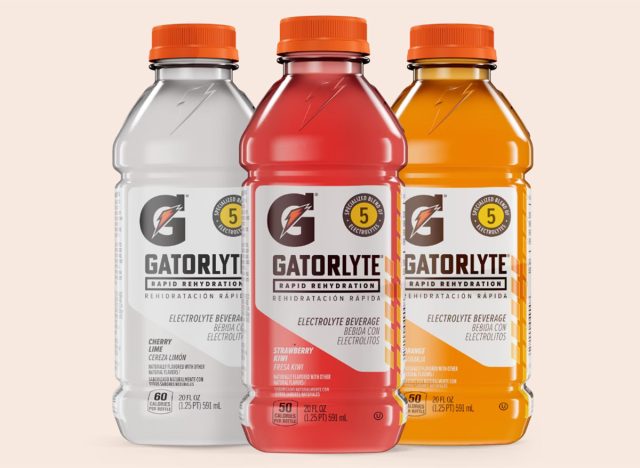
Calories: 60
Fat: 0 g (Saturated fat: 0 g)
Sodium: 490 mg
Carbs: 14 g (Fiber: 0 g, Sugar: 12 g)
Protein: 0 g
The Gatorade brand is one of the most well-known and original electrolyte beverages on the market. The Gatorlyte beverage is a newer Gatorade product containing a specialized, more concentrated blend of five electrolytes with fewer carbohydrates and sugar than the original. A higher concentration of sodium, potassium, magnesium, calcium, and chloride is specifically formulated to provide more rapid rehydration for athletes.
Gatorlyte is a good source of sodium, meeting over 20% of the daily recommended requirements, 25% of magnesium, and 45% of daily chloride needs. And while it is lower in carbohydrates than the original Gatorade, it still provides 14 grams of carbohydrates for a modest energy boost before a workout.
Gatorlyte is made without artificial sweeteners or colors and contains sugar and stevia leaf extract as sweeteners. It comes in Strawberry Kiwi, Cherry Lime, and Orange flavors. This option is good if you're seeking more electrolytes but prefer something lower on the carbohydrate end.
Harmless Harvest Coconut Water
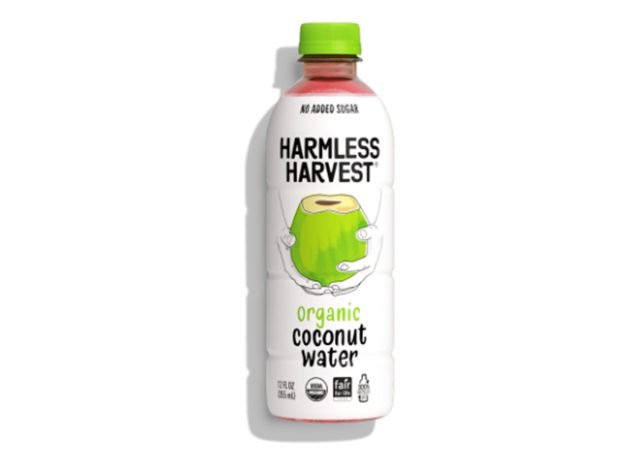
Calories: 90
Fat: 0 g (Saturated fat: 0 g)
Sodium: 55 mg
Carbs: 23 g (Fiber: 0 g, Sugar: 20 g)
Protein: 0 g
Coconut water is a source of naturally occurring electrolytes known for its light, slightly sweet taste. Harmless Harvest Coconut Water is a quality choice as it contains 15% of your daily potassium and 20% of your daily phosphorous requirements in one bottle. It also offers a small amount of magnesium and sodium.
While this coconut water contains 20 grams of sugar, it is natural sugar from coconuts. We also love that it is Fair Trade certified, which means the company is held to the highest social and environmental trade standards for fair and equitable labor practices.
Harmless Harvest Coconut Water is free from artificial colors, flavors, and sweeteners and contains only one ingredient—coconut water.
Due to its higher carbohydrate content, this beverage would be beneficial as a pre-workout drink for fuel. However, there are probably better options for overly salty sweaters because the drink is not as concentrated in sodium.
Electrolit
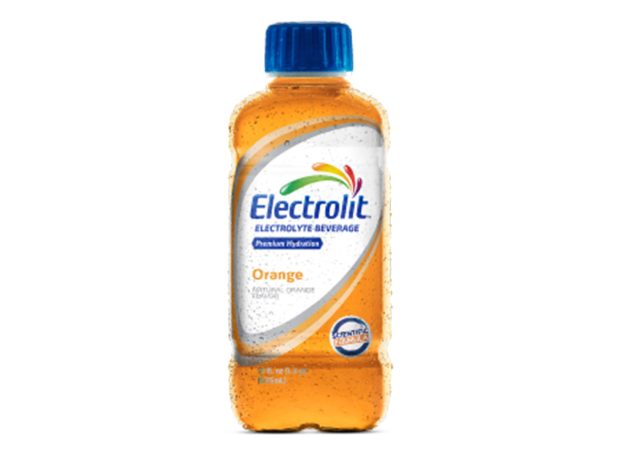
Calories: 70
Fat: 0 g (Saturated fat: 0 g)
Sodium: 250 mg
Carbs: 12 g (Fiber: 0 g, Sugar: 12 g)
Protein: 0 g
Electrolit is another quality electrolyte beverage made with pharmaceutical-quality ingredients. This product was first launched in 1950 as a solution for dehydration in children and has grown to be one of the most premium electrolyte brands on the market.
It contains a blend of five electrolytes aimed at performance, hydration, and recovery: sodium, potassium, magnesium, calcium, and chloride. It is highest in chloride, providing 15% of daily requirements.
Electrolit is sweetened with natural flavors, molasses, and stevia, a natural calorie-free sweetener. It does not contain any artificial sweeteners. This product has many options as it comes in 15 different flavors, including Fruit Punch, Berry Bliss, and Guava.
It's important to remember that one bottle of this product contains two 12-ounce servings.
Propel Electrolyte Water
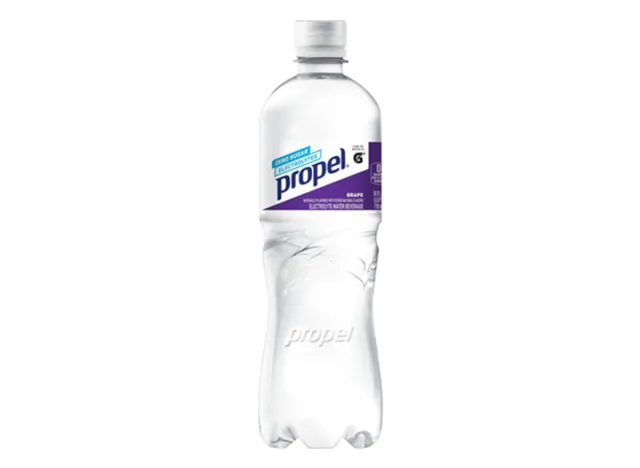
Calories: 0
Fat: 0 g (Saturated fat: 0 g)
Sodium: 230 mg
Carbs: 0 g (Fiber: 0 g, Sugar: 0 g)
Protein: 0 g
Propel Electrolyte Water is electrolyte-infused water made by the Gatorade brand. If you want to replenish electrolytes without calories or sugar, this product is a calorie- and sugar-free version of Gatorade.
And while it is not as concentrated in electrolytes as regular Gatorade, it still contains 10% of the daily value for sodium. It also supplies added vitamin B for energy and antioxidant vitamins C and E, which may reduce muscle damage after a challenging workout.
Propel Electrolyte Water does contain two artificial sweeteners in place of sugar—acesulfame potassium and sucralose. While these sweeteners are considered safe in moderation, some may find them too sweet or difficult to digest.
This product comes in nine hydrating flavors, including Berry, Black Cherry, and Lemon.
While this beverage provides some electrolytes, it contains no calories or carbohydrates. Because of this, it is not considered a significant fuel source before a workout. We'd recommend Propel Electrolyte Water as a beverage for general hydration rather than one for a pre-workout energy boost.
Pedialyte Sport
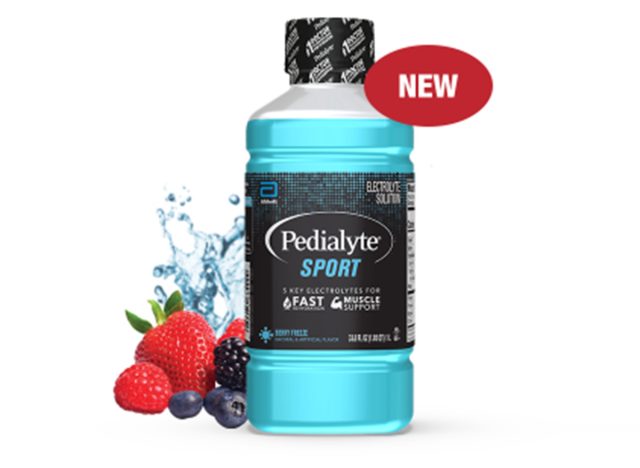
Calories: 30
Fat: 0 g (Saturated fat: 0 g)
Sodium: 490 mg
Carbs: 9 g (Fiber: 0 g, Sugar: 5 g)
Protein: 0 g
Pedialyte is a well-known brand for its line of pediatric electrolyte products. Pedialyte Sport is an electrolyte beverage designed for adult athletes seeking a higher concentration of electrolytes.
Pedialye Sport contains three times more electrolytes than leading sports drinks and five essential electrolytes, such as sodium, potassium, phosphorous, magnesium, and chloride, in concentrated doses. For example, it contains 21% of daily sodium and 30% of daily chloride requirements for optimal performance, reduction of muscle cramping, and fluid balance.
This product is available in three flavors: Berry Freeze, Fruit Punch, and Lemon Lime. It comes in 1-liter bottles; about 12 ounces is considered a serving. This may be a good electrolyte beverage if you are an endurance athlete or sweat excessively during workouts.
RELATED: 20 Best Potassium-Rich Foods You Can Eat
Bai Molokai Coconut Antioxidant Infused Water
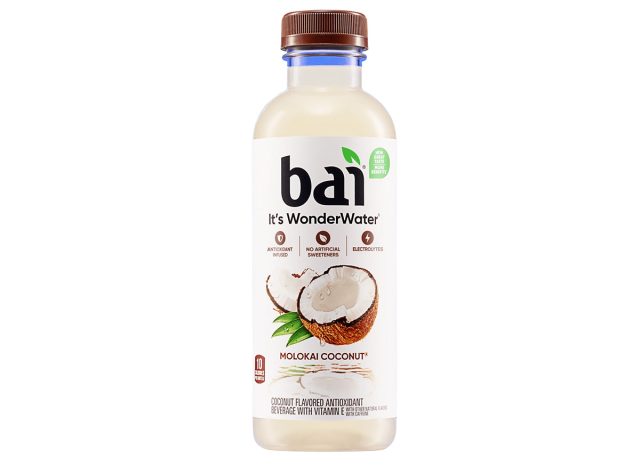
Calories: 10
Fat: 0 g (Saturated fat: 0 g)
Sodium: 70 mg
Carbs: 1 g (Fiber: 0 g, Sugar: 1 g)
Protein: 0 g
If you prefer the taste of coconut water, Bai Molokai Coconut Antioxidant Infused Water is a refreshing way to sneak in some extra electrolytes. At only ten calories per bottle and no added sugar, this beverage is a solid choice if you're looking for a low-calorie way to hydrate.
It is naturally sweetened with the calorie-free sweeteners stevia and monk fruit. It is most prominent in sodium and potassium, providing 3% and 8% of daily sodium and potassium needs. While this is a lower electrolyte concentration than other products on this list, it also contains added antioxidants such as zinc and vitamin E, which may aid in workout recovery.
This product stands apart from the others as it contains 55 milligrams of caffeine, about the equivalent of a cup of green tea. Some studies show consuming caffeine can provide a modest boost in performance; however, the amount needed would be significantly more than what is provided in this beverage.
Ghost Hydration Drink
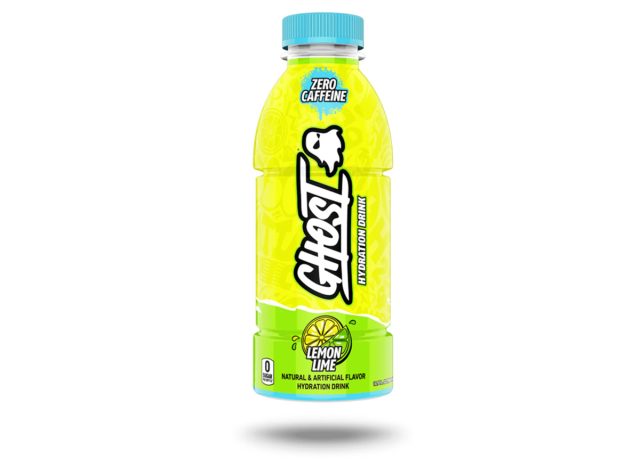
Calories: 10
Fat: 0 g (Saturated fat: 0 g)
Sodium: 40 mg
Carbs: 3 g (Fiber: 0 g, Sugar: 0 g)
Protein: 0 g
Last but not least, the Ghost Hydration Drink electrolyte beverage is another popular brand with five essential electrolytes, no caffeine, and no added sugar. At only 10 calories and 996 mg of total electrolytes per bottle, this is a quality choice if you're seeking a high concentration of electrolytes with minimal calories.
Ghost Hydration is highest in potassium, providing more than 20% of daily requirements, which can support optimal exercise performance. One bottle also provides 100% of the recommended daily intake for vitamins B6, B12, and C.
It comes in six flavors, including Lemon Lime, Orange Squeeze, and Sour Patch, which appeal to kids or kids at heart. It does contain artificial sweeteners and may taste too sweet, depending on your preference.
LMNT Sparkling Electrolyte Water
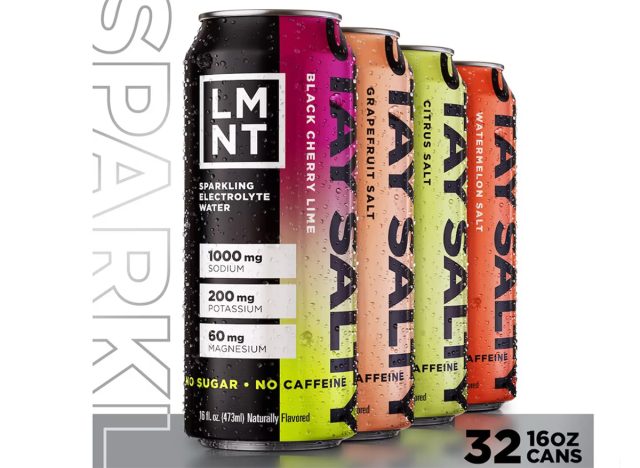
Calories: 5
Fat: 0 g (Saturated fat: 0 g)
Sodium: 1,000 mg
Carbs: 1 g (Fiber: 0 g, Sugar: 0 g)
Protein: 0 g
LMNT Sparkling Electrolyte Water tops our list of electrolyte drinks for its refreshing flavor and ingredient profile. LMNT is a well-known brand among athletes and packs a concentrated sodium content of 1,000 milligrams.
It also contains 200 milligrams of potassium and 60 milligrams of magnesium, which can also be lost through sweat. It is minimal in calories and carbohydrates, which is helpful if you are following a low-carb diet or trying to be mindful of your calorie intake. It is sugar-free and contains the natural no-calorie sweetener stevia, the taste of which many prefer over artificial sweeteners.
LMNT comes in 4 flavors: Black Cherry Lime, Grapefruit Salt, Citrus Salt, and Watermelon Salt.
This option would be best if you are an athlete who is a salty sweater or you frequently work long hours in hot, humid conditions where large amounts of sodium may be lost in your sweat. It is also ideal for those on a low-carb or keto diet who want to replenish electrolytes without carbs or sugar.
On the other hand, LMNT would not be the best choice for you if you have high blood pressure or are just drinking this beverage for general hydration due to its high sodium content.
Jocko Fuel Hydrate Electrolyte Drinks
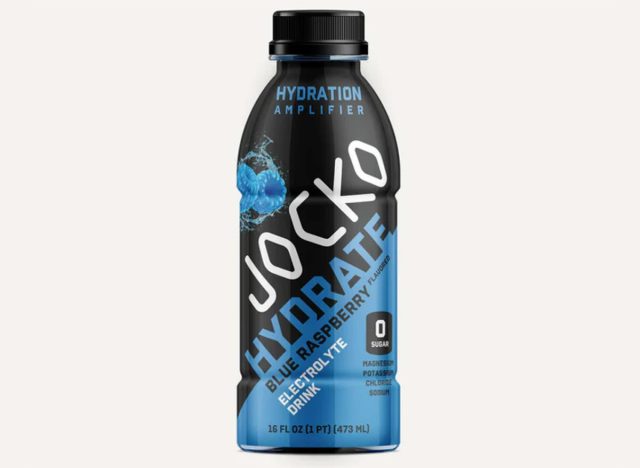
Calories: 15
Fat: 0 g (Saturated fat: 0 g)
Sodium: 300 mg
Carbs: 1 g (Fiber: 0 g, Sugar: 0 g)
Protein: 0 g
Jocko Fuel is a balanced electrolyte drink containing a blend of sodium, potassium, magnesium, and chloride. It is lower in calories at only 15 calories per can but includes a higher amount of magnesium and chloride that meets 25% of recommended daily requirements.
Research shows a positive link between magnesium levels in the body and physical performance. In addition, an electrolyte beverage rich in chloride like this can help support proper fluid balance. It also contains 300 mg of sodium, 13% of the daily requirement for adults.
Jocko Fuel comes in four refreshing flavors, including Blue Raspberry and Fruit Punch, and contains zero sugar. It is sweetened with allulose and monk fruit, two naturally occurring calorie-free sweeteners. It is also free of artificial flavors, colors, and additives and contains no banned substances for added peace of mind.
Bodyarmor Lyte Sports Drink
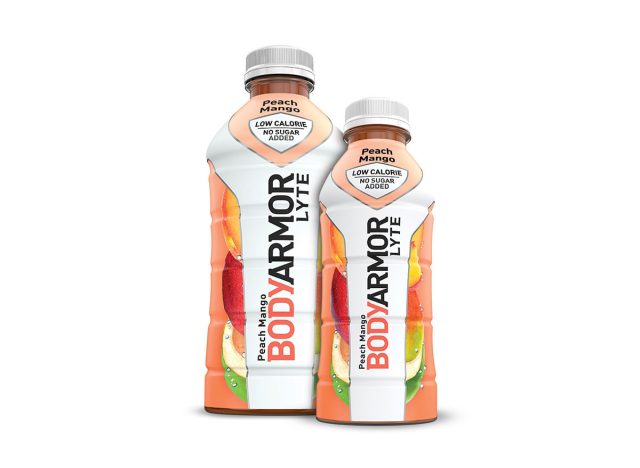
Calories: 15
Fat: 0 g (Saturated fat: 0 g)
Sodium: 30 mg
Carbs: 11-12 g (Fiber: 0 g, Sugar: 1-2 g)
Protein: 0 g
Bodyarmor Lyte is a low-calorie sports drink that is perfect for athletes mindful of their calorie and sugar intake. Its flavors contain no added sugar, only 1-2 grams of total sugar, no artificial sweeteners, and only 15 calories per bottle. Natural flavors and sweeteners, such as the sugar alcohol erythritol, are used instead.
Depending on the flavor, the drinks contain between 11 and 12 grams of carbohydrates for an energy boost.
While Bodyarmor Lyte only contains 30 milligrams of sodium, it provides 15% of the daily potassium and 20% of the daily magnesium requirements for pre- and post-workout performance and recovery. It also contains added B vitamins which may enhance endurance and reduce fatigue during workouts, as well as 70% of daily vitamin C recommendations for immunity.
Bodyarmor Lyte comes in seven delicious flavors, such as Strawberry Banana Lyte, Orange Clementine, and Peach Mango—perfect for a pre-or post-workout hydration beverage.
A Final Word on Electrolyte Drinks
Electrolyte drinks have become incredibly popular over the years, and consuming them can help ensure your body has the correct balance of electrolytes, especially after sweating or a significant amount of fluid loss, such as diarrhea or vomiting.
From coconut water to commercially prepared electrolyte drinks on the market, there is no shortage of electrolyte drinks to enjoy. And if your body needs an electrolyte boost, including one from our list may offer some major benefits in addition to an electrolyte-rich diet that includes plenty of fruits, vegetables, and dairy products.
If you have a medical condition or are unsure if you should take electrolytes, consult your doctor for individualized guidance.
Disclaimer: Dietary supplements are products intended to supplement the diet. They are not medicines and are not intended to treat, diagnose, mitigate, prevent, or cure diseases. Be cautious about taking dietary supplements if you are pregnant or nursing. Also, be careful about giving supplements to children unless recommended by their healthcare provider.
- Source: Strohm, D., Bechthold, A., Ellinger, S., Leschik-Bonnet, E., Stehle, P., Heseker, H., & German Nutrition Society (DGE) (2018). Revised Reference Values for the Intake of Sodium and Chloride. Annals of nutrition & metabolism, 72(1), 12–17. https://doi.org/10.1159/000484355
- Source: Kim J. (2023). Effect of high-dose vitamin C and E supplementation on muscle recovery and training adaptation: a mini review. Physical activity and nutrition, 27(2), 8–12. https://doi.org/10.20463/pan.2023.0012
- Source: Ghusn, W., Naik, R., & Yibirin, M. (2023). The Impact of Artificial Sweeteners on Human Health and Cancer Association: A Comprehensive Clinical Review. Cureus, 15(12), e51299. https://doi.org/10.7759/cureus.51299
- Source: Lau, W. Y., Kato, H., & Nosaka, K. (2021). Effect of oral rehydration solution versus spring water intake during exercise in the heat on muscle cramp susceptibility of young men. Journal of the International Society of Sports Nutrition, 18(1). https://doi.org/10.1186/s12970-021-00414-8
- Source: Hernández-Camacho, J. D., Vicente-García, C., Parsons, D. S., & Navas-Enamorado, I. (2020). Zinc at the crossroads of exercise and proteostasis. Redox biology, 35, 101529. https://doi.org/10.1016/j.redox.2020.101529
- Source: Kim, M., Eo, H., Lim, J. G., Lim, H., & Lim, Y. (2022). Can Low-Dose of Dietary Vitamin E Supplementation Reduce Exercise-Induced Muscle Damage and Oxidative Stress? A Meta-Analysis of Randomized Controlled Trials. Nutrients, 14(8), 1599. https://doi.org/10.3390/nu14081599
- Source: Guest, N. S., VanDusseldorp, T. A., Nelson, M. T., Grgic, J., Schoenfeld, B. J., Jenkins, N. D. M., Arent, S. M., Antonio, J., Stout, J. R., Trexler, E. T., Smith-Ryan, A. E., Goldstein, E. R., Kalman, D. S., & Campbell, B. I. (2021). International society of sports nutrition position stand: caffeine and exercise performance. Journal of the International Society of Sports Nutrition, 18(1), 1. https://doi.org/10.1186/s12970-020-00383-4
- Source: Lindinger, M. I., & Cairns, S. P. (2021). Regulation of muscle potassium: exercise performance, fatigue and health implications. European journal of applied physiology, 121(3), 721–748. https://doi.org/10.1007/s00421-020-04546-8
- Source: Bates, G. P., & Miller, V. S. (2008). Sweat rate and sodium loss during work in the heat. Journal of occupational medicine and toxicology (London, England), 3, 4. https://doi.org/10.1186/1745-6673-3-4
- Source: Strohm, D., Bechthold, A., Ellinger, S., Leschik-Bonnet, E., Stehle, P., Heseker, H., & German Nutrition Society (DGE) (2018). Revised Reference Values for the Intake of Sodium and Chloride. Annals of nutrition & metabolism, 72(1), 12–17. https://doi.org/10.1159/000484355
- Source: Caramoci, Adela & Nica, A.S. & Ionescu, Anca & Vasilescu, Mirela & PADURARU, DENIS & Mazilu, Virgil. (2015). Magnesium supplementation in top athletes - effects and recommendations. Medicina Sportiva. 1. 2482.
- Source: Bandak, G., & Kashani, K. B. (2017). Chloride in intensive care units: a key electrolyte. F1000Research, 6, 1930. https://doi.org/10.12688/f1000research.11401.1
- Source: Reno, A. M., Green, M., Killen, L. G., O'Neal, E. K., Pritchett, K., & Hanson, Z. (2022). Effects of Magnesium Supplementation on Muscle Soreness and Performance. Journal of strength and conditioning research, 36(8), 2198–2203. https://doi.org/10.1519/JSC.0000000000003827
- Source: Lee, M. C., Hsu, Y. J., Shen, S. Y., Ho, C. S., & Huang, C. C. (2023). A functional evaluation of anti-fatigue and exercise performance improvement following vitamin B complex supplementation in healthy humans, a randomized double-blind trial. International journal of medical sciences, 20(10), 1272–1281. https://doi.org/10.7150/ijms.86738
- Source: Moore, A., & Khanna, D. (2023). The Role of Vitamin C in Human Immunity and Its Treatment Potential Against COVID-19: A Review Article. Cureus, 15(1), e33740. https://doi.org/10.7759/cureus.33740









